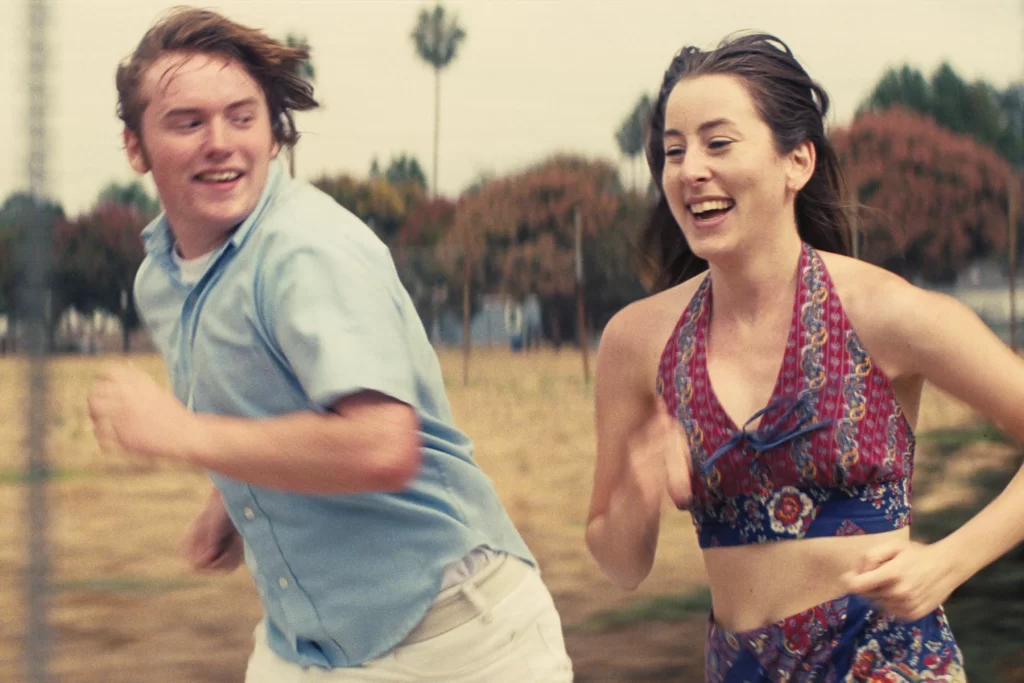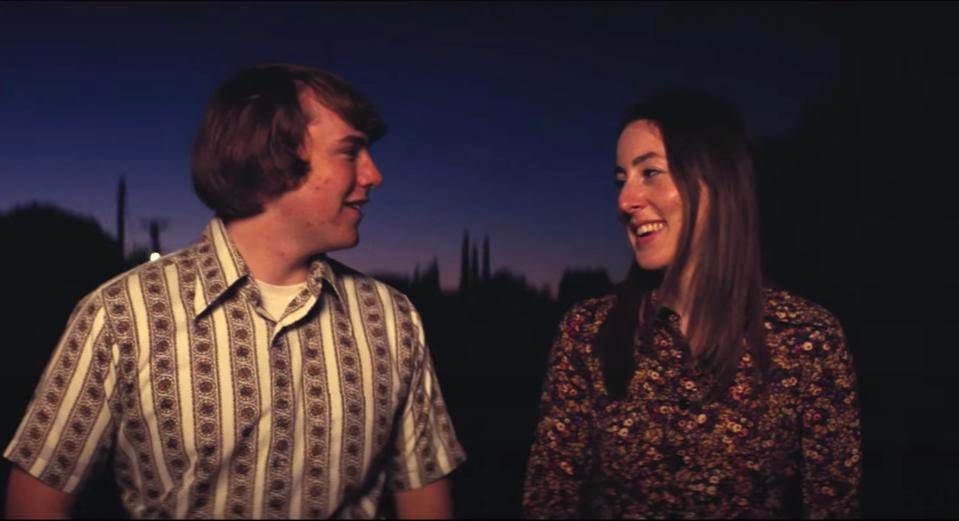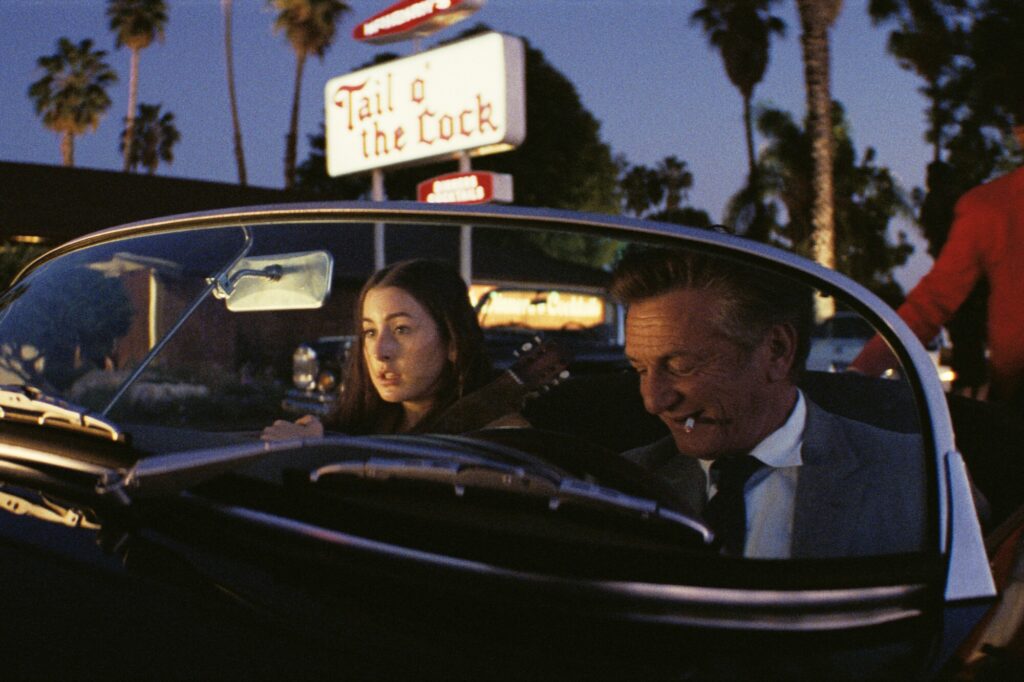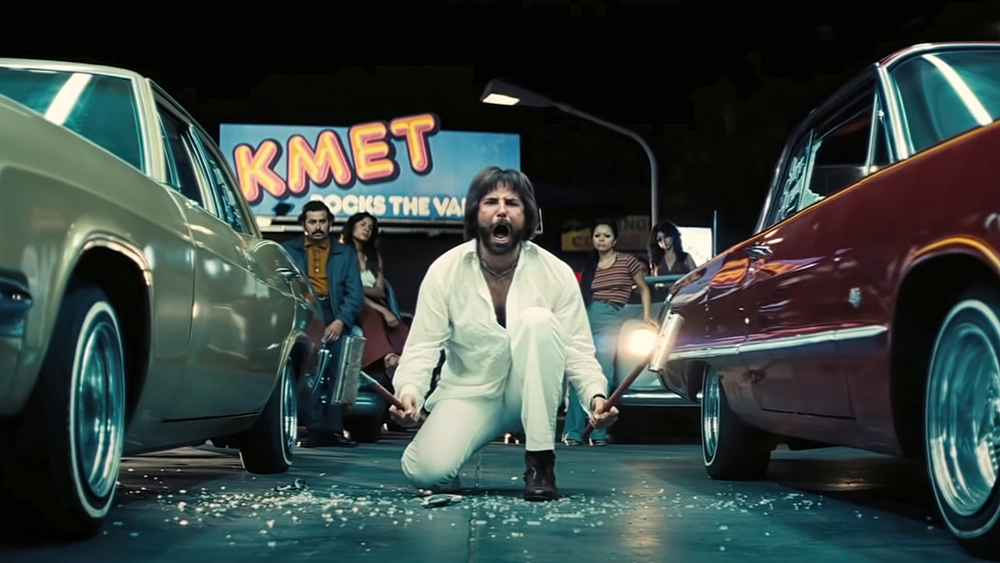
The heroes of Paul Thomas Anderson’s Licorice Pizza are always running, though they never seem to get anywhere. Their sprinting is heedless—the kind of panicked, exuberant racing that epitomizes the heightened quality of youth, when every crisis is life or death and every experience provokes either jubilation or disconsolation. They run and they run—across vacant golf courses and through crowded malls and down sunbaked streets—but they always end up back where they started, confused and angry and lost. They’re essentially attached to opposite ends of the same spoke, moving together in a constant circle, yet never coming any closer to their quixotic destination: each other.
This would seem to describe a doomed romance, a tragic love story that follows the trajectory of a Wong Kar-wai picture. Such a suspicion is only reinforced by the arc of Anderson’s filmography. He may be a more variable and omnivorous director than, say, his namesake Wes, but his movies tend to thrive on tension and conflict; the ruthless oil baron of There Will Be Blood, the fanatical cult leader of The Master, and the imperious fashion designer of Phantom Thread are all defined by their indomitable will, and his films derive their energy from the way their protagonists attempt to impose that will on a society that shackles and stifles them. So perhaps the happiest surprise of Licorice Pizza is how loose it is. Rather than straining to flatten us with grandiosity, Anderson has applied his considerable craft to a story that is warm, earnest, and relaxed. This is far from the weightiest effort of his career, but it may well be the sweetest. (The only real competition in that regard comes from the euphoric Punch-Drunk Love.)

The offshoot of this gently enveloping tone is that Licorice Pizza can occasionally feel minor when compared to the sheer might of movies like Boogie Nights or Magnolia, but don’t say that to its central character, Alana Kane. In fact, you may not want to say anything to Alana at all. A 25-year-old drifter who opens the film working as the assistant for a photographer, Alana (played by Alana Haim, whom Anderson has previously directed in multiple music videos) can be prickly and abrasive, prone to spasms of anger and fits of irritability. She is also sharp and vivacious, with a quick wit, easy smile, and bright, flashing eyes. She is, in other words, the prototypical crush for Gary Valentine (Cooper Hoffman, the late Philip Seymour’s son), a 15-year-old actor who first spies a scowling Alana stalking through the corridors of his school and immediately chats her up with the disarming, not-entirely-earned confidence of a local celebrity. Their initial conversation, which unfolds over a graceful, unobtrusive long take (Michael Bauman is credited as co-cinematographer, alongside Anderson himself), instantly sketches out the pair’s peculiar chemistry, a mixture of befuddlement, dyspepsia, and fascination. So when Gary invites Alana for (soft) drinks later that evening at the restaurant he frequents, she reflexively rejects the proposal, only to later find herself—due to a combination of dubious judgment, vexing intrigue, and lack of anything better to do—showing up.
Did you notice the respective ages of these not-quite lovebirds? The internet certainly did; it was impossible to be online in the latter stages of 2021 and avoid the dreaded Discourse, which swiftly became an oppositional battleground. There were, apparently, only two options: Either you thought Licorice Pizza normalized and glorified pedophilia, or you thought the people who thought that were ignorant buffoons incapable of distinguishing between depiction and endorsement. The (subjective) truth, as tends to be the case, lies somewhere within the demilitarized zone that separates these polarized camps. Relationships between 15-year-olds and adults should rarely be condoned, and the decade-wide gap between Gary and Alana casts an undeniable pall over their tentative quasi-romance, which the film clearly intends to bathe in a halcyon glow. At the same time, the troubling power dynamic that tends to accompany abusive dalliances is absent here; to the contrary, Alana is less Gary’s teacher than his employee. More importantly, the movie is entirely aware of its own potential ickiness; indeed, Alana’s immediate, mortified reaction to Gary’s advances is to object on the grounds of possible illegality. That she spends much of the remainder of Licorice Pizza drawing closer to Gary in spite of her better instincts is both a testament to their strange, asymmetrical attraction and an indictment of her moral fiber.

“Do you think it’s weird I hang out with Gary and his friends all the time?” she asks her older sister, the wise and unflappable Danielle. (The entire Haim family stands in as the Kane clan, with smirking eldest sibling Este landing some amusing barbs at Alana’s expense.) Alana’s knowledge that her question is rhetorical only deepens her own misery, the kind of self-loathing that a beautiful woman can acquire when she’s surrounded by predatory men. (Sure, Gary is a horny kid who constantly asks to see her boobs, but at least he doesn’t smack her on the ass like that aforementioned photographer.) And the marvel of Haim’s performance (her first in a feature) is how persuasively she conveys the agony of young-adult ennui without resorting to visible histrionics. As a character, Alana is thoroughly vainglorious—part of the appeal of spending time with Gary is that he worships her, which is why his subsequent flirtations with a different girl (Isabelle Kusman) are such a blow—but as an actor, Haim’s technique is entirely free of vanity, instead wielding an effortless naturalism to emphasize Alana’s simmering frustration and dilettantish ambition. For his part, Hoffman imbues Gary—an erstwhile star who quickly proves to be as hopeless and deluded as Alana—with a cocksure bravado that he weaponizes to shield his sweaty desperation.
The ramshackle plot that encircles these refreshingly complex characters is shaggy, leisurely, and episodic. (The setting is 1973 Los Angeles, and without being too showy about it, Anderson loads the picture with geographic and period signifiers—we see Nixon on TV and hear Vin Scully on the radio—that lend specificity to the universal coming-of-age genre.) As Alana and Gary grow perpetually nearer and apart, like celestial bodies tracing an elliptical orbit, they encounter a cast of colorful oddballs, some of whom are inevitably more interesting than others. Their scenes opposite the restaurateur Jerry Frick (John Michael Higgins) are marred by his bizarre tendency to speak in grossly accented Japanglish, while an elaborate set piece on a golf course—featuring Sean Penn as a sleazy William Holden stand-in and Tom Waits as a drunk director—doesn’t yield the anticipated payoff. (To be fair, Frick’s exaggerated gibberish results in a very funny punch line, while the golf scene draws its power from another of those mad dashes, only this time with Gary speeding away from the putative excitement and toward a discarded Alana.) More absorbing is Alana’s time volunteering for a slick mayoral candidate (Benny Safdie), or her and Gary’s joint venture selling waterbeds. The latter enterprise brings them into contact with Jon Peters (a magnetic Bradley Cooper), resulting in a miniaturized adventure involving a winding mountain roadway and a gas-starved delivery truck, at which point this tender and spiky comedy transforms—briefly, improbably, and spectacularly—into an action movie.

Anderson’s masterful staging of that sequence—the steadiness of the camera, the sparseness of the sound design, the escalating thrill of momentum—reminds you of his filmmaking chops, but he mostly keeps his craft invisible in Licorice Pizza, preferring to foreground his hapless, winning characters. (The exception is Jonny Greenwood’s persistently undulating score, which is more distracting than enchanting.) Some of the movie’s most urgent scenes simply involve people talking on the phone—as when Alana makes Gary regret what he wished for when she morphs into a sultry vixen while pitching a product—or even not talking on the phone—as during a heart-pounding non-exchange when they both catch their breath while waiting for the other to speak. And for all of the majestic images that Anderson has captured throughout his career, it is difficult to think of one that more perfectly encapsulates a picture’s sensibility than the moment where Alana is nestled next to a nominal rival, makes eye contact with Gary, and—in a gesture of righteous anger and sublime childishness—sticks out her tongue.
With its pastel colors and luminous 35-millimeter glow, Licorice Pizza is almost casual in its beauty, even as it chronicles characters who can be petty, jealous, and cruel. Yet the crudity of their actions only amplifies the sincerity of their desires, just as it enhances the film’s fine-grained emotional realism. Alana and Gary are imperfect people who make bad choices, but in one sense, their behavior is aspirational. When you have the opportunity to watch a movie as lively and charming as this, you don’t walk, you run.
Grade: A-
Jeremy Beck is the editor-in-chief of MovieManifesto. He watches more movies and television than he probably should.
